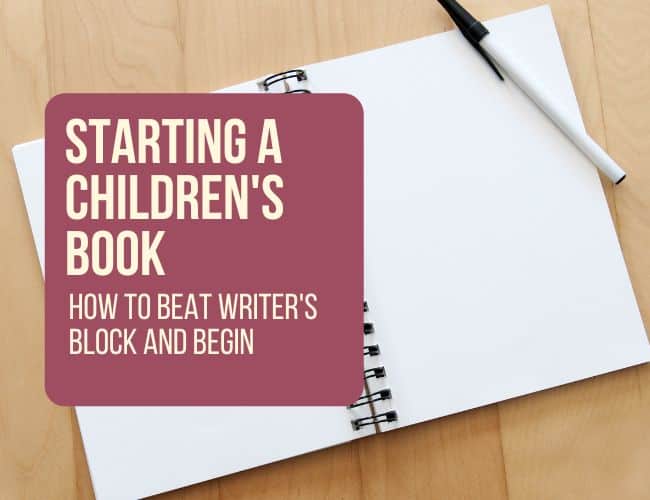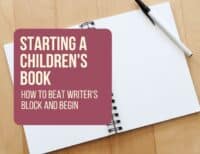We recently asked authors who struggle starting a children's book, “What's holding you back?”
The number one answer wasn't developing a book idea, finding book illustrators, or figuring out book format. It was about finding the confidence to start and finish well for the intended audience. So how do you start writing a children's book?

We received a number of responses when we asked, “What stops you from writing your children's book?” But one writer distilled the problem many aspiring authors face:
“What holds me back,” she answered, “is not a lack of time, but the confidence that I can communicate my story properly for my audience.”
A second writer echoed those concerns. “My fear is I can't come up with the best story that impresses those little hearts. I'm struggling with self-confidence,” he said.
They aren't alone! Even the great Stephen King has fears:
I’m afraid of failing at whatever story I’m writing—that it won’t come up for me, or that I won’t be able to finish it.
—Stephen King
Perhaps you share these concerns, too: the fear of not getting your story right or the fear of your story not being compelling, funny, or interesting enough. What I hope you'll notice, however, is that none of those fears can be realized until you actually start writing the story.
As a children's writer for more than 25 years, I have faced the blank page many times. In fact, I'm working on a new story right now, so I can speak in real time about what tips and tricks are working for me as I chisel a meaningful story out of the jumble of ideas in my head.
If you're stuck with writer's block and facing fear or uncertainty, perhaps you will find some of these ideas can help you, too!
What is Writer's Block?
First, let's examine writer's block for a minute. The dictionary defines it as: a psychological inhibition preventing a writer from proceeding with a piece.
While some of your inhibition may be caused by external forces, for example, rejection by a potential publisher or agent, most of our resistance is caused internally by self-doubt, perfectionism, or low motivation. And often the former (the rejection) begets the latter. It's like a physical dam blocking the flow of creativity.
But you don't have to let writer's block keep you from starting your children's book.
3 Ways to Jumpstart Your Creativity as You Start Your Children's Book
When you experience writer's block, I find three things are helpful: Mantra, Movement, and Muse.
1. Mantras or Affirmations
When writer's block is caused by a lack of confidence, you can find tremendous courage by creating empowering phrases. Mantras and affirmations are simply words or phrases you repeat to yourself to adopt new beliefs. Repeat them between sips of coffee, while taking a shower, and of course, as you open up your computer or notebook to begin writing.
Here are just a few suggestions, and I'm sure you can think of others.
- I am a writer.
- I have engaging stories to tell.
- Words and ideas flow effortlessly from my brain and fingertips.
- I am writing for my perfect reader.
- I get better the more I write.
2. Movement
In a previous article, I wrote about the power of movement to spark ideas for kids where science writer Ferris Jabr confirms walking promotes new connections between brain cells.
When you're feeling stuck, go for a walk, jog, or hike. Put on a video and do some yoga.
When you exercise, your body releases chemicals called endorphins that trigger a positive feeling in the body. Positive feelings lead to more self-confidence which, you guessed it, leads to more inspired thinking!
3. The Muse of Writing Prompts
Sometimes we get stuck because we put pressure on ourselves to write our story perfectly. Using writing prompts releases that pressure and helps you cultivate the connection between brain and hand, words to paper.
A quick search on The Write Practice will give you many prompts to choose from, such as this article with ten of the best creative writing prompts or this one with one hundred prompts! (And don't overthink it. Just pick one and get the hand moving across the page or keyboard.)
Add a writing prompt to your morning ritual. Answer a prompt before you begin working on your story. Think of it as stretching to increase your writing flexibility!
From Stuck to Story: 7 Ways to Get What's in Your Head on Paper
Now that we've covered some ways you can unblock your creativity, I want to offer a list of other suggestions to help you go from stuck to storytelling. These are some surefire ways to start writing your children's book today:
1. Start a Children's Book with Your Story Intention
In my How to Write a Children's Book article, I touched on Story Intention: asking yourself what you want your writer to know/feel/do/understand at the end of reading your book. You might try writing your intention across the top of your document.
For example, My target reader will understand how to show generosity and kindness to his or her community.
Or, My target reader will know that trying and failing is the way to success.
Having this clarity can be a touchstone for you as you begin to write.
2. Record Yourself Telling the Story
The pressure to write an entire story perfectly the first time can block you from starting at all.
Grab your smartphone or another recording device and simply talk your way through your story. Go for a walk, and imagine you're telling your story to a classroom of your target audience. Don't worry for a second about short, succinct sentences.
When you're done, you can listen and transcribe your story to paper. You may find you have a very solid first draft to build on!
3. Write Snippets and Short Phrases
The other day, I opened my laptop to start a children's book about promises, specifically all the promises we can and cannot make to our kids.
Instead of trying to write a complete story, I started by making a random list down the page: home, time, choices, wishes, etc. I simply brainstormed all the things one can promise.
Then I started playing with alliteration: sunshine and swinging. Playgrounds and puppets.
I have no idea if these phrasings will make it into my final manuscript, but I enjoyed playing with words. You can do this with bits of dialogue or a silly snippet that pops into your head. Take the pressure off and have fun!
4. Give Yourself a Word, Time, or Page Count
Author Julia Cameron, creator of The Artist's Way, offers a daily writing practice called Morning Pages. She calls it “the bedrock tool of a creative recovery.” Morning Pages are essentially “three pages of longhand, stream of consciousness writing about anything and everything that crosses your mind.”
The idea is to create a visible place and way to “dispose of” all the thoughts running through your mind to get on with the day at hand. This practice also opens up the portal to your creativity.
If three pages feel daunting, you can tell yourself “fifty words” or “thirty minutes.” Like setting your running shoes by the door to exercise, you need to develop practices to encourage yourself to get the words moving.
5. Mind Map Your Story
Lines of writing on paper are only one way to write a story. Change up your visual approach, and you may find new inspiration.
For example, draw a big circle in the center of a piece of paper. Write your story intention or working title in the circle.
Now, write your ideas around the circle. Map or draw possible beginnings, middles, and endings. Add fun phrases.
Simply working in a new way can unlock your writing and creativity! Instead of your brain thinking, “Oh, here we go again with this writing thing,” perhaps it will think, “Oh, this is a fun way to approach the story!”
6. Practice Allowing
Part of what stops the flow of creativity is pre-defining your outcome. You may feel pretty darn certain about your story idea, but then you get stuck in the middle of the story.
Ask yourself what your story is trying to tell you. Does it want to say something different? End with a twist you hadn't considered?
Practice allowing your creativity and writing to lead you. Allow the story to go places you hadn't planned. Give your words the power to reveal themselves to you!
7. Find a Focus “Listening Group”
If you've written a story and you're not sure it's “compelling enough,” you can connect with a school or childcare center with kids the age of your target market / target age range and offer to do a free storytime.
Ask the kids and teacher which parts of the story they liked best. Which parts did or didn't connect? Did they laugh? Were they bored?
You can imagine all sorts of reactions until you actually get them.
There are also many mom or parent groups out there. Offer to bring coffee and donuts in exchange for their opinions on your writing. People love to help and feel part of the process.
Or you can join a more formal writing group where you listen and offer feedback to one another.
Starting a Children's Book: Every Story Begins with a Single Word
You are not alone if you're feeling unsure about what you have to say or how to start. Every story, poem, essay or article begins with a single word. Every perfect title begins with several not-quite-right ones.
But the beautiful thing is how one word after another becomes a sentence and then a paragraph and, soon, a story! You simply need to start with a single word. My hope is that some of the ideas here help get you on your way!
How do you jumpstart your writing process? Please share your best tips in the comments below.
PRACTICE
Let’s spend our practice time sharing the gift of beginning.Take fifteen minutes to write.
In the practice box below, state your idea for a children's book and the Story Intention and Target Reader if you have these in mind.
Then write a few lines from any part of the book. Perhaps it's the opening sentence or a few lines of action in the middle. Or maybe it's a snippet of dialogue you've crafted for your main character.
It could look like this:
Hi, I'm Marianne and I'm writing a book about promises we can make to our children so they can feel certain of their parent's presence. My Target Reader is a mom and young child, ages 2–6.
Then I wrote this potential line for the story:
When you're woefully willful and eager to test, I promise you limits for safety and rest.
I'm feeling like the word “safety” isn't quite right. But at least now I've begun. Write your own and add it to the practice box below. Don't forget to leave feedback for three other writers, too.
I'm Marianne Richmond—writer, artist and inspirationalist. My words have touched millions over the past two decades through my children's books and gift products.
Basically I put love into words and help you connect with the people + moments that matter. You can find me on my website, Facebook, and Twitter (@M_Richmond21).





0 Comments